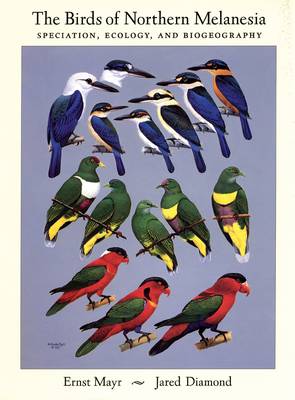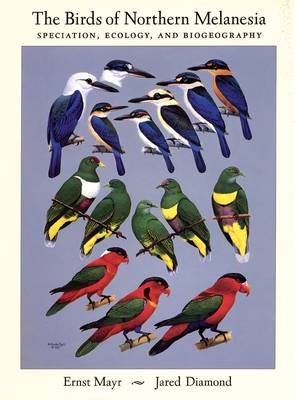
Door een staking bij bpost kan je online bestelling op dit moment iets langer onderweg zijn dan voorzien. Dringend iets nodig? Onze winkels ontvangen jou met open armen!
- Afhalen na 1 uur in een winkel met voorraad
- Gratis thuislevering in België vanaf € 30
- Ruim aanbod met 7 miljoen producten
Door een staking bij bpost kan je online bestelling op dit moment iets langer onderweg zijn dan voorzien. Dringend iets nodig? Onze winkels ontvangen jou met open armen!
- Afhalen na 1 uur in een winkel met voorraad
- Gratis thuislevering in België vanaf € 30
- Ruim aanbod met 7 miljoen producten
Zoeken
The Birds of Northern Melanesia
Speciation, Ecology, and Biogeography
Ernst Mayr, Jared Diamond
Hardcover | Engels
€ 136,45
+ 272 punten
Omschrijving
Speciation is the process by which co-existing daughter species evolve from one ancestral species - e.g., humans, chimpanzees, and gorillas arising from a common ancestor around 5,000,000 years ago. However, many questions about speciation remain controversial. The Birds of Northern Melanesia provides by far the most comprehensive study yet available of a rich fauna, composed of the 195 breeding land and fresh-water bird species of the Bismarck and Solomon Archipelagoes east of New Guinea. This avifauna offers decisive advantages for understanding speciation, and includes famous examples of geographic variation discussed in textbooks of evolutionary biology.
The book results from 30 years of collaboration between the evolutionary biologist Ernst Mayr and the ecologist Jared Diamond. It shows how Northern Melanesian bird distributions provide snapshots of all stages in speciation, from the earliest (widely distributed species without geographic variation) to the last (closely related, reproductively isolated species occurring sympatrically and segregating ecologically). The presentation emphasizes the wide diversity of speciation outcomes, steering a middle course between one-model-fits-all simplification and ungeneralizable species accounts. Questions illuminated include why some species are much more prone to speciate than others, why some water barriers are much more effective at promoting speciation than others, and whether hypothesized taxon cycles, faunal dominance, and legacies of Pleistocene land bridges are real.
These years of study have resulted in a huge database, complete with distributions of all 195 species on 76 islands, together with their taxonomy, colonization routes, ecological attributes, abundance, and overwater dispersal. Color plates depict 88 species and allospecies, many of which have never been seen before. For students of speciation, Northern Melanesian birds now constitute a model system against which other biotas can be compared. For population biologists interested in other problems besides speciation, this rich database can now be mined for insights.
The book results from 30 years of collaboration between the evolutionary biologist Ernst Mayr and the ecologist Jared Diamond. It shows how Northern Melanesian bird distributions provide snapshots of all stages in speciation, from the earliest (widely distributed species without geographic variation) to the last (closely related, reproductively isolated species occurring sympatrically and segregating ecologically). The presentation emphasizes the wide diversity of speciation outcomes, steering a middle course between one-model-fits-all simplification and ungeneralizable species accounts. Questions illuminated include why some species are much more prone to speciate than others, why some water barriers are much more effective at promoting speciation than others, and whether hypothesized taxon cycles, faunal dominance, and legacies of Pleistocene land bridges are real.
These years of study have resulted in a huge database, complete with distributions of all 195 species on 76 islands, together with their taxonomy, colonization routes, ecological attributes, abundance, and overwater dispersal. Color plates depict 88 species and allospecies, many of which have never been seen before. For students of speciation, Northern Melanesian birds now constitute a model system against which other biotas can be compared. For population biologists interested in other problems besides speciation, this rich database can now be mined for insights.
Specificaties
Betrokkenen
- Auteur(s):
- Uitgeverij:
Inhoud
- Aantal bladzijden:
- 548
- Taal:
- Engels
Eigenschappen
- Productcode (EAN):
- 9780195141702
- Verschijningsdatum:
- 6/12/2001
- Uitvoering:
- Hardcover
- Formaat:
- Genaaid
- Afmetingen:
- 185 mm x 251 mm
- Gewicht:
- 1365 g

Alleen bij Standaard Boekhandel
+ 272 punten op je klantenkaart van Standaard Boekhandel
Beoordelingen
We publiceren alleen reviews die voldoen aan de voorwaarden voor reviews. Bekijk onze voorwaarden voor reviews.











